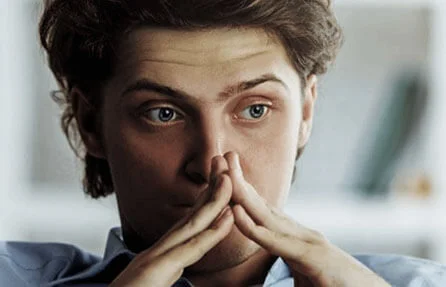If you’re reading this article, you are most likely either a loved one seeking help for someone suffering with alcohol addiction, or you’re suffering yourself and reaching out for help to recover. Either way, this article will be invaluable in both situations.
What is an “Alcoholic”?
To answer that question, we’re not going to ask you to count the number of drinks you consume on any given day or week and refer you immediately to your GP. Instead we’re going to help answer this question for you by defining exactly what an alcoholic is – or isn’t in this case.
The Oxford Dictionary defines “alcoholic” as:
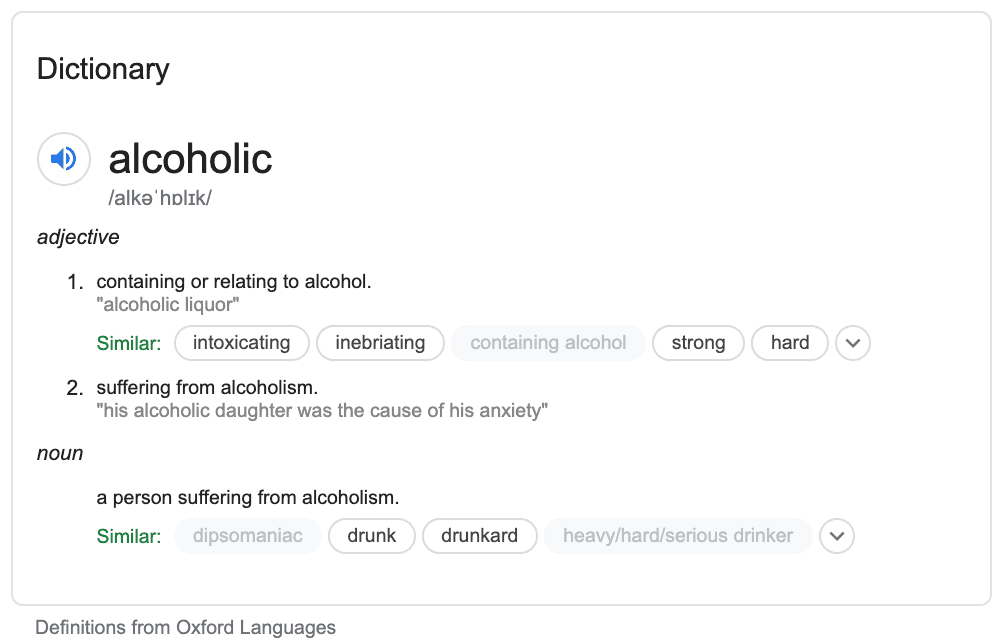
So the applicable answer there is the noun – suffering from alcoholism. Let’s ask the Oxford Dictionary to define Alcoholism for us next:
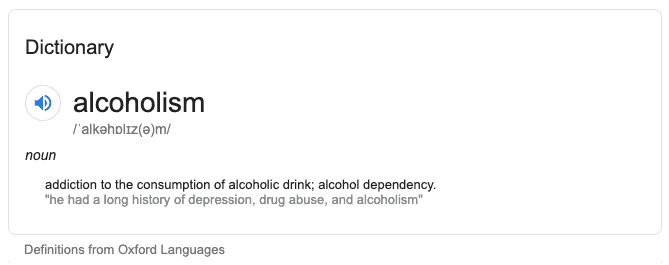
Now we’re getting somewhere. Defining alcoholism as addiction to the consumption of alcohol makes sense. According to that simple logic, we could safely assume that a person who is addicted to smoking cigarettes would also have a similarly associative noun. Let’s ask the Oxford Dictionary what the definition of a Tobaccoholic is:
Nothing there.
What about a Heroinolic?
Nothing.
Iceolic?
Again, nothing.
Gambolic?
Still nothing.
Sexaholic?
Nope.
The examples listed above all relate to substances and behaviours that are highly addictive. This is because consuming these substances or undertaking these activities activates the reward centre of the brain, triggering a shortcut that causes a powerful surge of dopamine – “The Happy Chemical”. Dopamine is a naturally occurring neurotransmitter that – along with serotonin, endorphins and oxytocin – regulates how happy we feel.
The brain is an incredibly sophisticated data input and memory processing device. It is designed to experience, respond, remember and repeat positive experiences in the most effective way possible. It also uses these same abilities to help you avoid any negative experiences it has experienced in the past. Hence, by consuming substances that artificially spike the brain’s feel good chemicals, the brain learns to shortcut the natural process of dopamine production and go straight to the easy source – in this case alcohol.
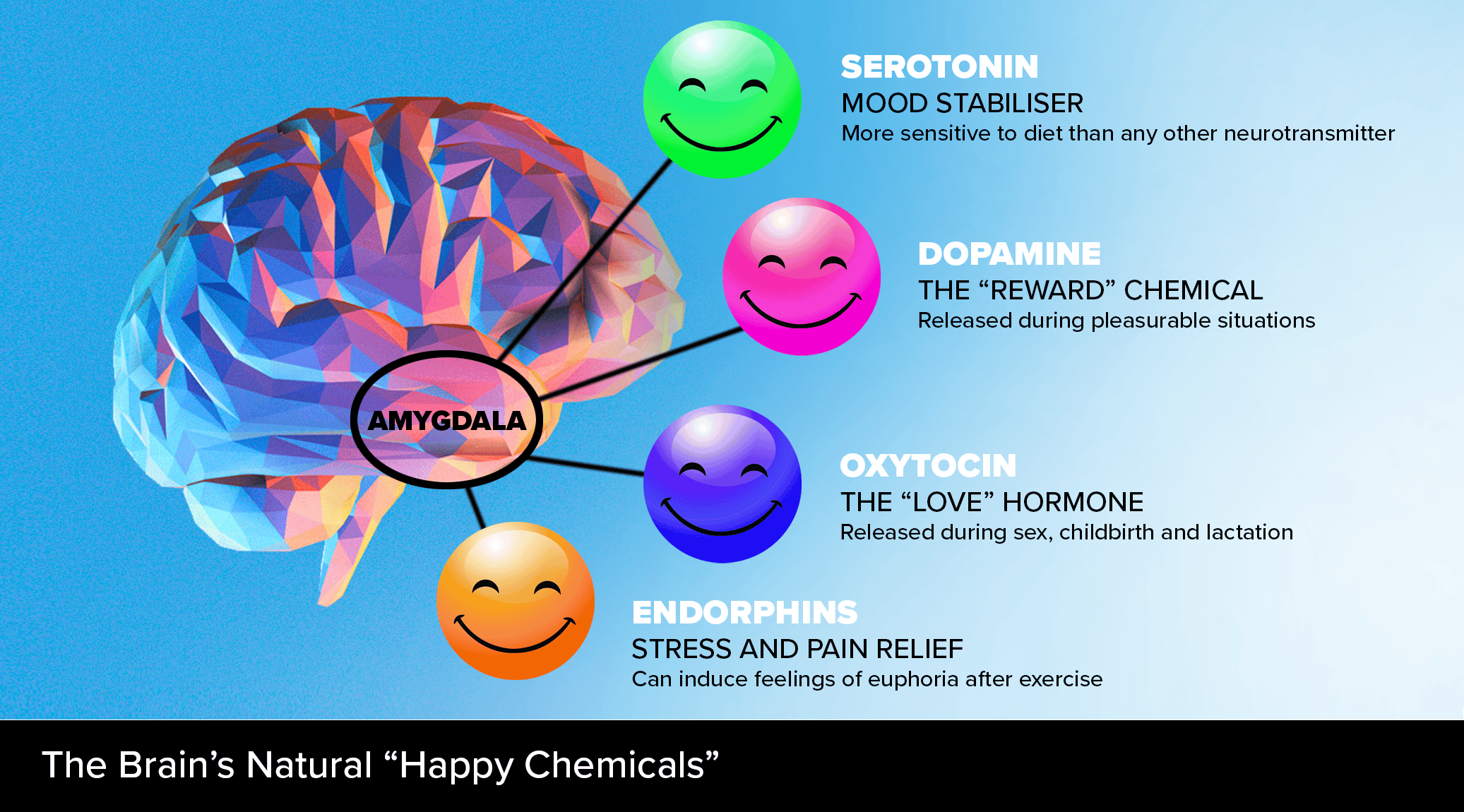
The Amygdala – the part of the brain that regulates emotions – quickly creates a conditioned response to regular consumption of alcohol that forms the basis of an addiction. Why wait for a gentle release of dopamine from watching a child play or receiving a compliment from a loved one when it can get an instant super surge from a large glass of wine or a comforting pint of beer?
Now we know the basics of how addiction works, let’s reject the inaccurate label of an Alcoholic. Along with its degrading and inaccurate stereotype of a filthy, ranting, crazy man living under a bridge, protectively cradling his 2L flagon of port in a brown paper bag….

Going forward with this discussion, any references to the term alcoholic will be encased in inverted commas and we will use these alternatives – alcohol dependence, alcohol addiction or alcohol misuse.
So am I an “Alcoholic”?
"CHARACTERISTICS OF AN “ALCOHOLIC”
Now we are in agreement there is no such thing as an “Alcoholic”, you might also be surprised to learn there are some outstanding character traits people with alcohol dependence issues often have in common. Highly functioning people with an alcohol addiction are likely to be:
- Over achievers
- Above average intelligence
- Consistently employed and sought after
- Well-liked and empathetic
- Skilled at compartmentalising their lives
- Well groomed and presented
- Highly articulate
- Skilled multi-taskers
- Ambitious
- Self-analytical
- Loyal

Not quite the stereotype we see in the movies is it? There’s no shame in those characteristics listed. Quite the opposite. Does this list resonate with you? The reality for most people with an alcohol dependency is that they’re highly functional, productive members of society who suffer silently with the effects of their addiction behind closed doors.
Is alcohol a drug?
We have already established that alcohol – along with heroin, tobacco, sex, shopping, marijuana etc – are all substances and activities that cause unnaturally powerful spikes in the brain’s “happy chemicals”. With regular use, these habits form well-worn neuropathways that form the basis of an addiction.
Any substance or behaviour that causes unnatural changes in the brain’s finely tuned balance of chemicals is defined as a drug. Let’s consult our trusty Oxford Dictionary again on the definition of a drug:
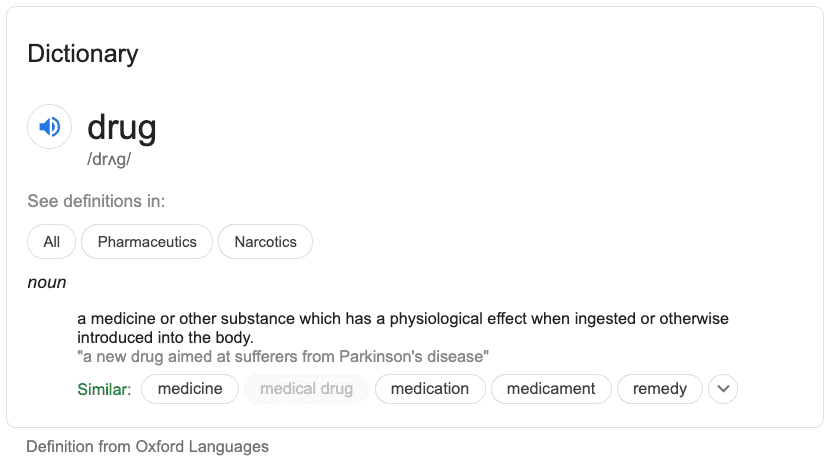
Once again, we need to tear down a stereotype to get to the truth.
Is alcohol legal? Yes
Was it always legal? No
(remember Prohibition – a nationwide ban on alcohol in the US from 1920-1933?)
Is alcohol socially acceptable? Yes
Are Mums encouraged to relieve their stress at wine o’clock? Yes
Are corporates encouraged to unwind from a stressful week with messy Friday night drinks? Yes
Is a barbecue without beer in Australia a barbecue? Debatable
Does alcohol have physiological effects on the brain and body when induced? Yes
Therefore, it is a drug. A highly addictive drug. It’s a highly marketable, highly taxed, totally legal drug of addiction. It was designed to be addictive and marketed to be the answer to all our problems and the partner for all our celebrations. Has alcohol done exactly what it was designed to do – snuck into your life and made itself comfortable without your knowledge? Perhaps far too comfortable?…
NEXT IN THIS SERIES:
Am I addicted to Alcohol?
- Stopping the physical intake (Detoxing) is the easiest step
- What is the key to recovery from alcohol addiction?
- How can I change my core beliefs around alcohol?
ABOUT THE AUTHOR:
Emanuele Latino
Palladium Private Program Director & Psychologist
https://www.linkedin.com/in/emanuele-latino-31b56352/

Emanuele and his team take a compassionate approach to clients’ struggles in order to promote awareness and initiate together the transformative process. Palladium Private’s BioPsychoSocial program approaches a range of treatment modalities from Gestalt, Emotionally Focused Therapy, Dialectical and Cognitive Behaviour Therapy, EMDR, ACT, to Neuropsychotherapy, Sensorymotor Psychotherapy and the Cape Cod Model for Couple Therapy.
